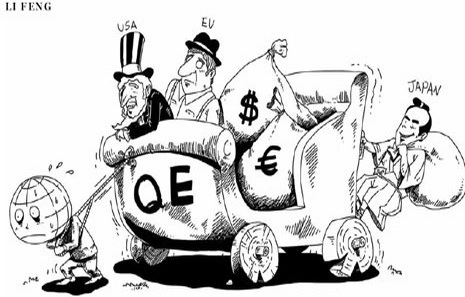Takashi Nakamichi writes: Japan’s central bank should hold fire on extra measures for some time to ensure the economy doesn’t “overheat,” an economic adviser to Prime Minister Shinzo Abe said.
The inflation rate may be falling back toward zero on a drop in global oil prices, but it will “eventually start rising on its own” and likely reach around 2% by early 2016.
Mr. Honda, one of the most vocal advocates of aggressive monetary easing, said cheaper oil in the long run will strengthen inflationary pressure by stimulating consumer spending. A weak yen, the effects of the ongoing Bank of Japan easing, and anticipated increases in base pay this year will also put upward pressure on prices.
“Under these circumstances, if you undertook additional monetary easing, (the inflation rate) would go even higher,” Mr. Honda, a Shizuoka University professor, said. “Is it necessary to do such a thing?”
Mr. Honda added that even if the inflation rate declines further, as long as the main cause of it is an oil-driven drop in costs, and as long as Japan’s demand-supply gap is improving, “additional easing shouldn’t be undertaken.” Otherwise, the economy “could overheat over the latter half of this year,” he said.
Mr. Honda’s remarks were the latest in a series of comments from the government and advisers to the prime minister suggesting that the Abe administration sees additional easing as counterproductive, at least in the near-term. The development represents a rare departure from the traditional pattern in which the government regularly pushes the BOJ to do more to end a decade and a half of deflation.
Ruling party politicians appear particularly worried that if extra easing causes the yen to weaken more, further raising the costs of imports, that would reflect poorly on their parties in next month’s municipal elections. Yet if domestic demand remains weak beyond the summer, further easing could become necessary. The yen’s period of excessive strength appears to have ended.
A measure of fair value known as purchasing power parity suggests the present dollar-yen levels may be at a kind of upper limit in the exchange rate’s comfort zone.
The yen could weaken further if the BOJ takes additional easing action or if the U.S. Federal Reserve starts raising its policy interest rate, but that would only be a temporary “overshoot,” Mr. Honda said. “Even if the Japanese yen depreciated more, it would come back to the comfort zone. That’s my guess.”

